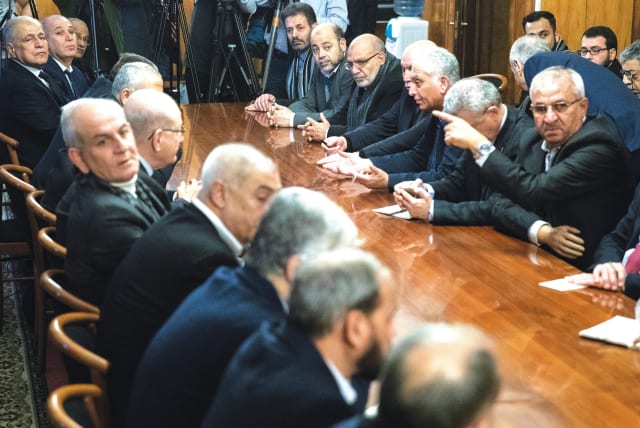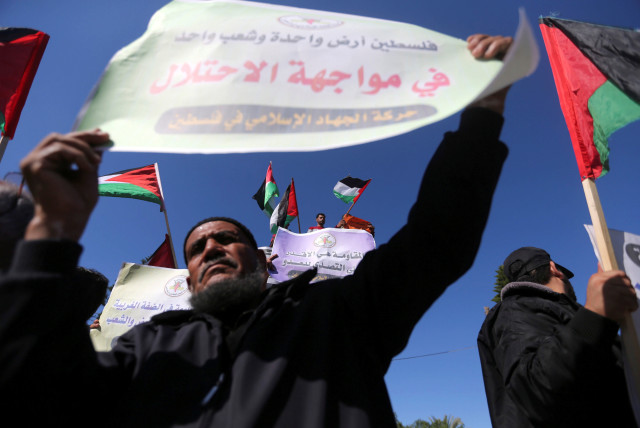All eyes are on Russia as a mediator between Hamas and Fatah - editorial

Russia’s role as the host and mediator of these talks is particularly noteworthy. Moscow appears to be leveraging its perceived victories in Ukraine to expand its influence in the Middle East.
In the ever-evolving geopolitical landscape, the recent announcement of a meeting between representatives of Hamas and Fatah in Moscow marks a significant moment not only for Palestinian politics but also for the broader Middle Eastern dynamics.
Scheduled for Thursday, this gathering aims to discuss the formation of a unified Palestinian government and rebuilding Gaza, reflecting a critical juncture in Palestinian national aspirations. The involvement of Russia as a mediator underscores its growing ambition to assert influence in the Middle East, especially in the wake of its perceived successes in Ukraine.
Hamas, recognized as a terrorist organization by several Western countries, holds control over the Gaza Strip and maintains a staunch opposition against Israel, advocating for a radical Islamic state through both political and militant means. On the other hand, Fatah is a prominent Palestinian political party and the leading faction within the Palestine Liberation Organization (PLO), which has historically pursued a path toward Palestinian statehood through negotiation and diplomacy.
The backdrop to this meeting is a complex tapestry of regional politics, internal Palestinian divisions, and the aftermath of conflict. Days prior, the resignation of Palestinian Prime Minister Mohammad Shtayyeh signals a political shake-up intended to consolidate support for the Palestinian Authority. This move is seen as a response to the conflict in Gaza, underlining the need for a unified front against external pressures and the reconstruction of the war-torn region.
Palestinian Foreign Minister Riyad al-Maliki’s tempered expectations for the talks in Moscow reflect the intricate balance of hope and realism that characterizes the Palestinian approach to these negotiations. “We hope that there might be good results in mutual understanding between all factions about the need to support such a technocratic government that will emerge,” Maliki stated, highlighting the aim for a government capable of navigating the challenging political landscape. However, the shadow of previous failed negotiations looms large, raising questions about achieving substantial progress.

The dynamics between Hamas and the Palestinian Islamic Jihad (PIJ), particularly their stance in ongoing hostage talks and the broader context of the Gaza war, introduce further layers of complexity. Israel’s military focus on Rafah and the wider strategy to pressure Hamas underscore the fraught nature of ceasefire and peace negotiations. This reflects the precariousness of the situation and the challenges facing any negotiation efforts.
Russia’s role
Russia’s role as the host and mediator of these talks is particularly noteworthy. Moscow appears to be leveraging its perceived victories in Ukraine to expand its influence in the Middle East. “For Russia, the opportunity to bring together the Palestinians and pressure Israel could come in the wake of their sense of victory in Ukraine,” suggesting that Moscow sees this as an opportune moment to assert its role in the region.
This move nevertheless has its challenges. Russia’s capacity to mediate effectively between Hamas and Fatah and, by extension, influence the course of Israeli-Palestinian relations will depend on its ability to navigate the intricate web of regional alliances, rivalries and interests. Moreover, the efficacy of Russian mediation will be tested by the internal dynamics within the Palestinian factions and their relations with other regional powers.
The discussions in Moscow, therefore, represent more than just meetings between Palestinian factions; they are a microcosm of the shifting geopolitical currents in the Middle East. The outcome of the talks could have significant implications, not only for Palestinian unity and the future of Gaza but also for the regional balance of power.
While the Moscow meeting between Hamas and Fatah offers a glimmer of hope for Palestinian unity and the reconstruction of Gaza, it also highlights the complex interplay of regional politics, internal divisions, and international diplomacy.
The involvement of Russia as a mediator adds a layer of geopolitical intrigue, suggesting a possible realignment of forces in the Middle East. As these talks unfold, the international community will be watching closely, aware that the stakes extend far beyond the immediate concerns of Palestinian governance, to encompass the broader dynamics of power and influence in the region.
